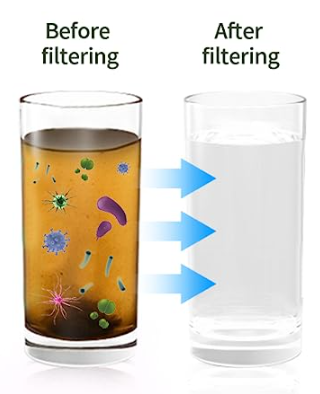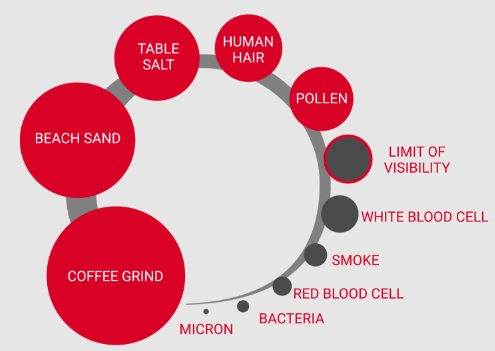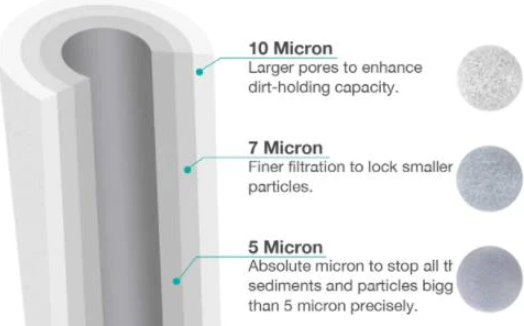Water impurities are generally measured in microns, which are a unit of length equal to one millionth of a meter (0.000001 m). As such, water impurities can range from 0.2 to 100 microns in size. The smaller the particle, the harder it is for traditional filtration systems like sediment filters, reverse osmosis, and carbon filters to remove them. Consequently, it is important to use advanced purification systems like ultrafiltration or nanofiltration to eliminate the smaller particles that are below 1 micron in size. This ensures that your water supply remains safe and free from water impurities. Therefore, micron size is an important factor to consider when selecting a water filtration system.
By properly understanding the size of water impurities in microns, you can make sure that your drinking water is free from harmful contaminants. This will help keep you and your family safe from potentially dangerous water-borne diseases. Additionally, knowing the micron size of water impurities helps to identify the correct filtration system for a specific application. For example, if you know the size of water impurities in a certain area is predominantly smaller than 1 micron, then an ultrafiltration or nanofiltration system would be the best option for your filtration needs. Ultimately, understanding the micron size of water impurities is key to ensuring safe drinking water and sifting through the myriad of filtration systems on the market.
By understanding water impurities and their micron size, you can make sure that your drinking water is safe and free from harmful contaminants. This knowledge helps to ensure that you select the right filtration system for your specific application. Doing so will help keep you and your family safe and healthy. Therefore, when it comes to water filtration, microns are an important factor to consider.
To summarize, the size of water impurities is often measured in microns with particles ranging from 0.2 to 100 microns in size. This means that traditional filtration systems like sediment filters, reverse osmosis, and carbon filters may not be able to eliminate the smaller particles below 1 micron in size. Consequently, for these types of water impurities, advanced purification systems like ultrafiltration or nanofiltration should be used in order to ensure safe drinking water. Ultimately, understanding the micron size of water impurities is essential to selecting the right filtration system for your needs.
By being aware of water impurities and their micron size, you can make sure that your drinking water is safe from harmful contaminants and select the appropriate filtration system for a specific application. This will help keep you and your family healthy and safe from potentially dangerous water-borne diseases. Therefore, micron size is an important factor to consider when selecting a water filtration system.
END OF CONTENT.
*********
How Many Microns Are In Water Impurities?

Water impurities can vary greatly in size, which is measured in microns. A micron, or micrometer, is one-millionth of a meter (1/1000 of a millimeter). Any particle larger than 40 microns will be visible to the naked eye.
The size range of water impurities typically spans from 0.002 to 500 microns, although they can be even smaller or larger in certain cases. The most common type of water impurity is suspended solids, which range between 0.001 and 150 microns in size. Organic matter (such as algae) usually measures between 0.2 and 5 microns, while sand particles can be as large as 500 microns.
How Many Microns Are Water Impurities? Intro
Water impurities are contaminants that can make water unsafe for drinking, washing, or recreational use. These can include bacteria, viruses, minerals and metals, chemicals, and other substances. The size of these impurities is measured in microns; the smaller the particle size, the more difficult it is to remove them from water. In this article
*********
What Is A Micron?

A micron is a unit of measure used to describe the size of tiny particles. A micron, or micrometer, is equal to one-millionth of a meter in length. It can also be expressed as 0.000001 meters or 1/25400th of an inch.
What Does A Micron Do In A Water Filter?

Using a filter with micron ratings is an effective way to remove contaminants from water. By trapping particles that are larger than the micron size, sediment and other impurities can be filtered out of the water. The smaller the micron rating, the more effective the filter will be at removing smaller particles. For example, a 10-micron filter will remove particles that are 10 microns or larger, while a 5-micron filter will remove particles that are 5 microns or larger. This can be helpful in removing water impurities such as dirt, sediment, and rust. Knowing how many microns are needed to effectively filter out the desired contaminants is essential when selecting a water filter. The size of the particles in the water will determine what micron size is best for the application.
For example, the EPA recommends a filter of at least 20 microns to remove most standard contaminants from drinking water. For removing smaller or more microscopic particles, higher micron ratings may be required such as 1-5 microns.
What Does A Micron Mean In Water Filters?
A micron is a unit of measurement that corresponds to one-millionth of a meter. It is used to measure the size of very small particles in water. Water impurities, such as bacteria and sediment, can range anywhere from 0.5 microns up to 100 microns or more in size. When it comes to water filtration, most filters are designed to remove particles of 5 microns and larger. This means that the filter will be able to catch larger impurities such as sediment, rust, and silt but won’t necessarily be able to remove the smaller bacteria and virus particles that cause water contamination. To effectively protect against viruses and other contaminants, it is important to use a filter with a micron rating of 1-5 or even 0.2 microns, depending on the water’s quality. In general, the smaller the micron rating, the better a filter will be at removing impurities from your drinking water.
Types Of Water Filter Micron Levels
Sediment Filters: These filters generally range in micron ratings from 1 to 100 microns and are designed to remove silt, sand, rust, and other large particulates from water.
Carbon Block Filters: Carbon Block filters usually have a micron rating of 0.5, which is small enough to block chlorine, taste and odor.
Reverse Osmosis Filters: Reverse osmosis filters typically have a micron rating of 0.001 to 0.0001, which is small enough to remove bacteria, cysts, parasites, lead, and other contaminants from the water.
Common Micron Ratings
0.5 Micron: Very fine filters, capable of removing very small particles such as cysts and rust.
1 Micron: These filters are usually used to remove silt and sediment from your water.
5 Micron: This filter is effective in reducing dirt, gravel, some bacteria, and ultraviolet disinfection.
10 Micron: This filter can remove large amounts of sediment, and is usually used for general-purpose filtration.
20 Micron: These filters are usually used to remove larger particles such as sand and debris from your water.
Ultimately, the size of water impurities that you need to filter out will.
– 10 Micron: Will reduce a wide range of contaminants, including sand, rust and dirt.
– 20 Micron: This filter is effective in removing large particles such as gravel, silt and sand from your water supply.
25 microns and above: These filters can reduce sediment, particles, and some bacteria from your water.
Depending on the source of your water, you may need different micron ratings to remove certain impurities. It is important to know what type of contaminants are in your water, so you can choose the right filter for your needs. Additionally, different filtration systems may require more advanced micron ratings than others. Make sure to consult a specialist to determine the best solution for your water supply.
What Micron Filter Do I Need? How Many Microns Should My Water Filter Be?

The size of the micron filter you need will depend on the level of impurities in your water. Generally, it is recommended that you use a filter with 1 to 5-micron openings for most particles, although 3 microns or even 0.5 microns may be necessary if there are smaller particles present. For example, if there are 500 parts per million (ppm) of dissolved solids present in the water, then a 0.5-micron filter is recommended to remove them efficiently. Additionally, if the impurities in your water are larger than 5 microns, then using an even smaller filter may not be necessary. It’s important to understand what type
How To Choose The Right Micron Rating?
Larger Surface areas and Depth Filters
Multiple Filter stages can help
Common Impurities In Water
Microorganisms: A wide array of bacteria, viruses, and parasitic protozoa can contaminate water. These microorganisms range in size from 0.2 microns to 10 microns or more.
Particulate Matter: Suspended particles smaller than 10 microns such as silt, sand, clay, iron, and other minerals may also be found in water.
Organic Compounds: These include pesticides, herbicides, and other agricultural chemicals, as well as industrial pollutants such as petroleum products. Many of these compounds are less than 1 micron in size.
Inorganic Chemicals: Common examples include heavy metals, nitrates, and sulfates. These may be present in water in amounts as small as 0.1 micron.
FAQs
Choosing The Appropriate Micron Rating
- Understand What Needs To Be Brought To Light.
- “Smaller” Does Not Always Equate To “Better.”
- Filters get clogged with time.
FAQs
What Micron Filter Is Needed For Well Water?
The Well water requires a filter with a 25-micron rating or less for the effective removal of sediments, dirt, particulates, dust, and other contaminants.
What Are Nominal And Absolute Micron Filters?

Nominal and absolute micron filters are two kinds of water filtration systems that can help remove impurities from your drinking water. The difference between them lies in the size of the particles they are able to filter out.
A nominal micron filter uses a mesh screen or other type of porous material with tiny holes in it to capture particles. These filters are rated according to the size of the holes, and they can filter out particles as small as 1 micron in diameter.
An absolute micron filter, on the other hand, is able to remove particles that measure even smaller than 1 micron. This type of filtration system uses tiny layers of activated carbon, sintered metal, or other media to capture particles like dust, sediment and bacteria. Each layer of the filter can remove different size particles from the water. Absolute micron filters can remove impurities as small as 0.2 microns in size.
Can A One-Micron Filter Efficiently Purify The Salt From My Water Softener?
No, a one-micron filter is not efficient enough to remove salt from the water softener. Salt molecules are too small, and a finer filter would be needed for this application. Additionally, it’s important to remember that the most effective way to purify your water is by using both physical and chemical filtration methods. A pre-filter can help to remove larger particles from the water, while chemical treatments can help to eliminate bacteria and other contaminants. For best results, it’s recommended to use an appropriate combination of both filtration and treatment methods.
What Is The Smallest Size Of Particle That A One-Micron Filter Can Remove?
A typical one-micron filter can effectively remove particles that are one-micron in size or larger. This includes most viruses and bacteria, as well as some water impurities like clay, sediment, rust and other particulates. However, it is important to remember that a filter of this type may not be able to address all types of contaminants, so it’s
How Long Does A 1-Micron Water Filter Last?
The life of a one-micron filter depends largely on the type and quality of water that it is filtering, as well as its maintenance schedule. Generally speaking, most one-micron filters can last for up to six months with proper care.
What Micron-Size Sediment Filter Is Good For Residential Use?
There are hundreds of physical, chemical, biological, and radiological elements removed by water filters, including lead, chlorine, bacteria, calcium, minerals, salt, and carcinogens. Most drinking water purification methods look to remove the majority of those contaminants.
What Impurities Can Water Filters Eliminate?
Particulates: Water filters can remove particles like dirt, sand, and rust that are 10-50 microns in size.
Microorganisms: Bacteria, parasites, and other pathogens that can cause waterborne illnesses are often 0.5 to 2 microns in diameter or larger. Quality water filters can effectively remove them.
Organic compounds: Carcinogenic organic compounds like benzene, chlorine, and other volatile organic compounds (VOCs) are typically much smaller than 1 micron in size, but some quality water filters can eliminate them as well.
Heavy Metals: Many water filters can reduce the presence of heavy metals such as lead, arsenic, and mercury to safe levels. The size of these metals particles vary depending on the type of metal.
Conclusion
The size of water impurities can vary greatly, ranging from a few microns in diameter down to single molecule sizes. The smaller the particle, the more difficult it is to remove from water. In general, anything below 5 microns is considered small enough to pass through most filtration systems without being removed. Anything over 20 microns is considered large enough to be caught in most filtration systems. The size of the particles can depend on the type of impurity, and it is important to understand what size of particles will be present when looking at a water filtration system. Different types of filters are designed to catch different sizes of particles, so it is essential to know what type of impurities are present in a water system. Knowing the size of impurities in water can help you choose the right filtration system for your needs.

Meet Jeffrey B Roberts, your dedicated guide into the realm of water science and technology. As a hydro biologist with an insatiable curiosity, Jeffrey’s journey has been one of unraveling the mysteries of water systems and advocating for clean, safe water for all.
With an academic background steeped in the sciences, Jeffrey’s passion lies at the crossroads of science, technology, and nature. A deep fascination with plants and genetics has not only enriched their understanding of aquatic ecosystems but has also propelled them into the world of water softening solutions.
Believing that clean water is a basic human right, Jeffrey’s writing transcends the technicalities, making the intricate world of water softening accessible to all. Through their blog, they ardently share insights, tips, and breakthroughs, empowering readers to make informed decisions about their water quality.
Beyond his role as a prolific writer, Jeffrey is a respected figure in the hydronics industry education. With years of hands-on experience, they serve as an adjunct professor, nurturing the next generation of experts at the Thaddeus Stevens College of Technology. His involvement on the Technical Advisory Board further cements their dedication to pushing the boundaries of innovation in water technology.
